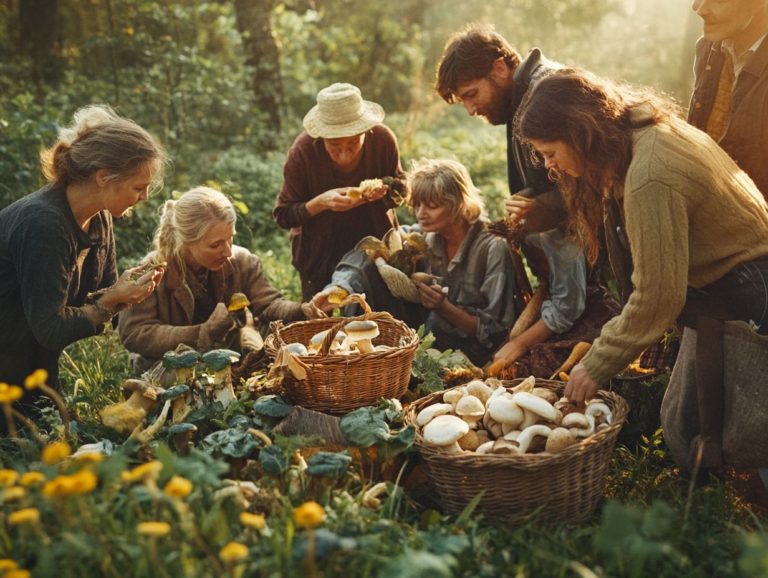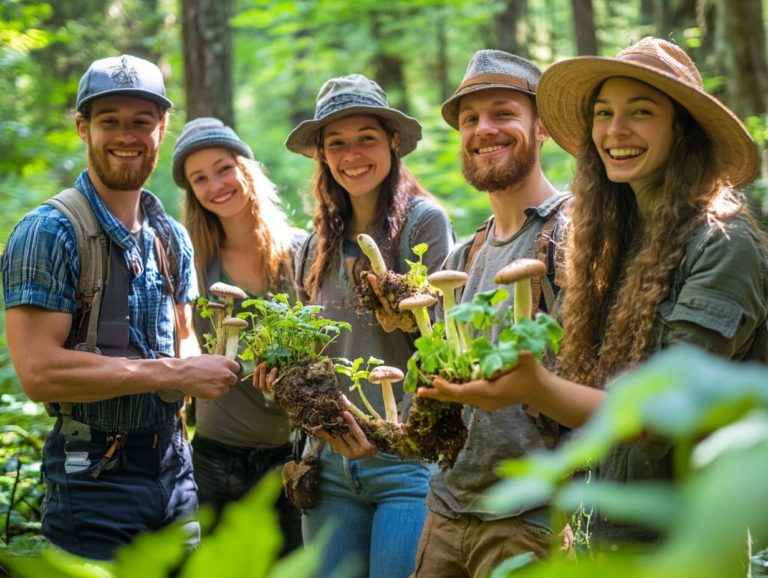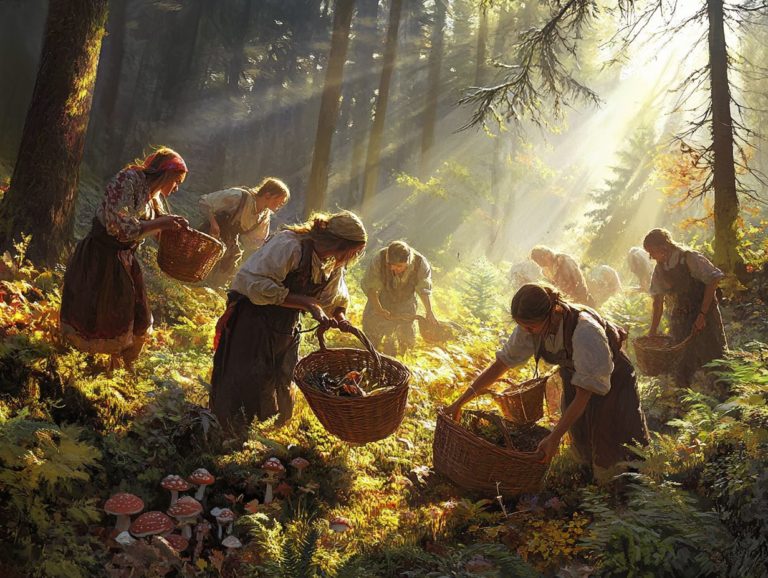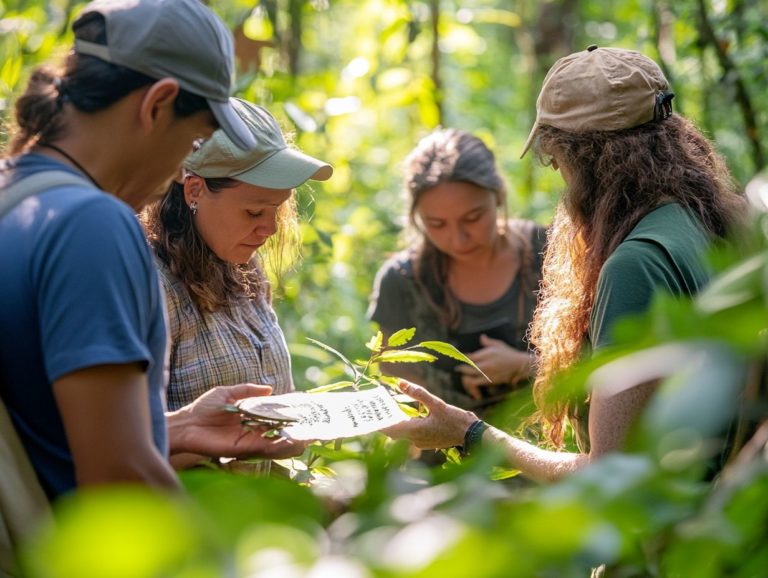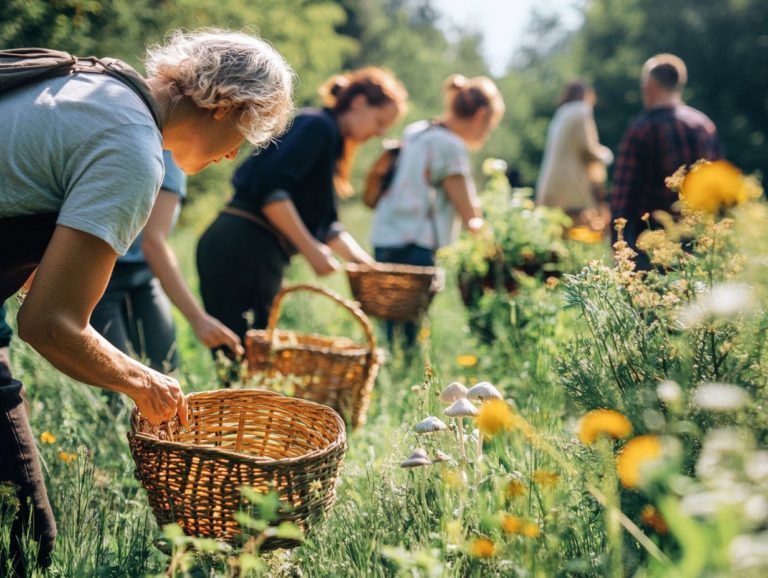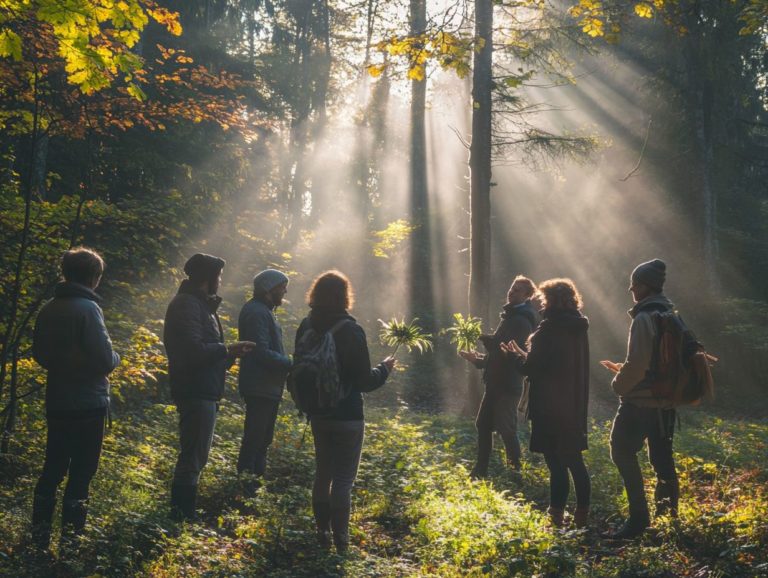How to Find Local Foraging Certifications
Foraging is the timeless art of gathering wild food. Recently, it has gained popularity, and with it comes the need for proper knowledge and skills.
Getting certified sharpens your foraging skills. It also ensures that your practices are safe and sustainable.
This article explores the types of foraging certifications available. We ll guide you on selecting the one that aligns with your goals and how to prepare for the certification process.
Becoming certified opens up a world of benefits. You’ll connect with fellow foragers in your community who share your passion.
Whether you re experienced or just starting out, understanding these aspects can greatly enhance your foraging experience.
Contents
- Key Takeaways:
- The Importance of Foraging Certifications
- Types of Foraging Certifications
- Certification Programs and Organizations
- How to Choose the Right Certification
- Factors to Consider
- Finding Local Foraging Certifications
- Researching Available Programs
- Preparing for the Certification Process
- Benefits of Becoming Certified
- Frequently Asked Questions
Key Takeaways:
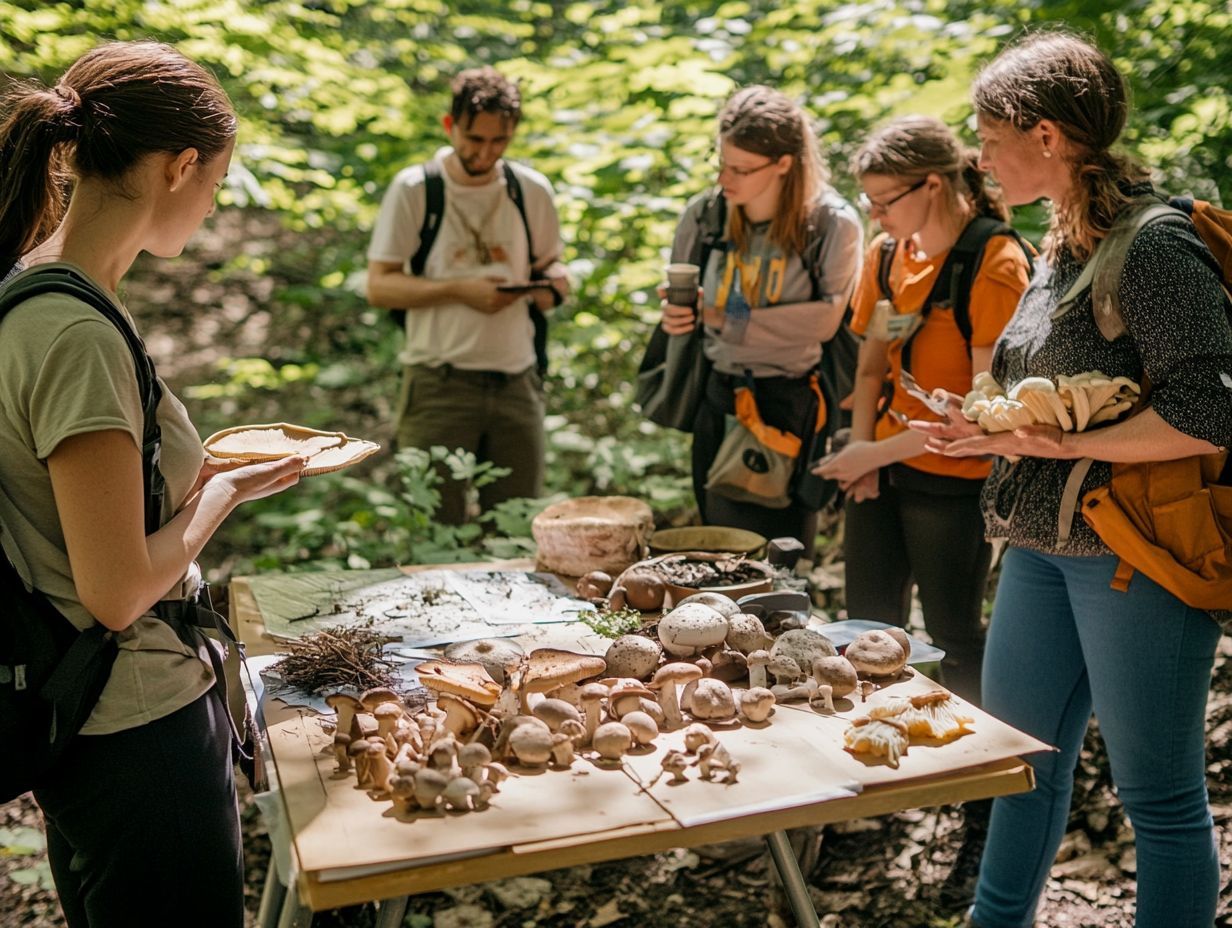
- Foraging certifications are essential for safety, sustainability, and credibility in the community.
- Different programs offer various types of foraging certifications; research to find the right fit for you.
- Thoroughly prepare for the certification process to ensure success and enjoy the benefits of being certified.
The Importance of Foraging Certifications
In Michigan, foraging certifications ensure food safety and quality, especially when harvesting wild mushrooms like the Morel. The Michigan Department of Agriculture emphasizes these certifications because they equip you with vital knowledge about different mushroom species.
These certifications also create a community of foragers who follow state regulations and uphold best practices.
Why Certifications are Necessary for Foraging
Certifications are crucial for maintaining food safety standards. They ensure that you can accurately identify edible mushrooms like the Morel, reducing the risk of misidentification and poisoning.
These programs serve as a defense for you and consumers, especially in Michigan, where regulations are strict. By learning about mushroom identification, you will distinguish between safe and toxic varieties.
Rigorous training and exams enhance your knowledge and build confidence. This preparation helps you make informed decisions in the field.
Following these standards is essential for your safety and for protecting public health in the community.
Types of Foraging Certifications
You can find various foraging certification programs, such as the Morel mushroom certification. This specific program is offered by reputable organizations like the Michigan Mycological Society and accredited colleges in Michigan. If you’re interested in taking it a step further, you might also explore how to organize a local foraging event.
These institutions provide courses that are integrated into their curriculum, ensuring you receive a comprehensive education in this fascinating field.
Certification Programs and Organizations
Numerous organizations, such as the Midwest American Mycological Information and the Michigan Mycological Society, provide exciting certification programs. These include the Morel Mushroom Certification and online workshops designed specifically for aspiring foragers like you, eager to enhance your skills and knowledge.
These programs feature detailed curricula that delve into essential topics such as mushroom identification, finding where mushrooms grow, and harvesting mushrooms without harming the environment. They focus on best practices set by the Michigan Department of Agriculture, which includes important rules to keep food safe for everyone. You can expect engaging sessions led by experienced instructors who share invaluable insights and practical tips. The recertification process, which is the process of renewing your certification to keep your skills current, ensures that your knowledge remains up-to-date.
Online workshops have gained popularity for their flexibility, allowing you to learn at your own pace and fit your training around your busy schedule. This convenience makes it easier for both novice and seasoned foragers to deepen their understanding and appreciation of the captivating world of mushrooms. Don t miss out on the chance to elevate your foraging skills!
How to Choose the Right Certification
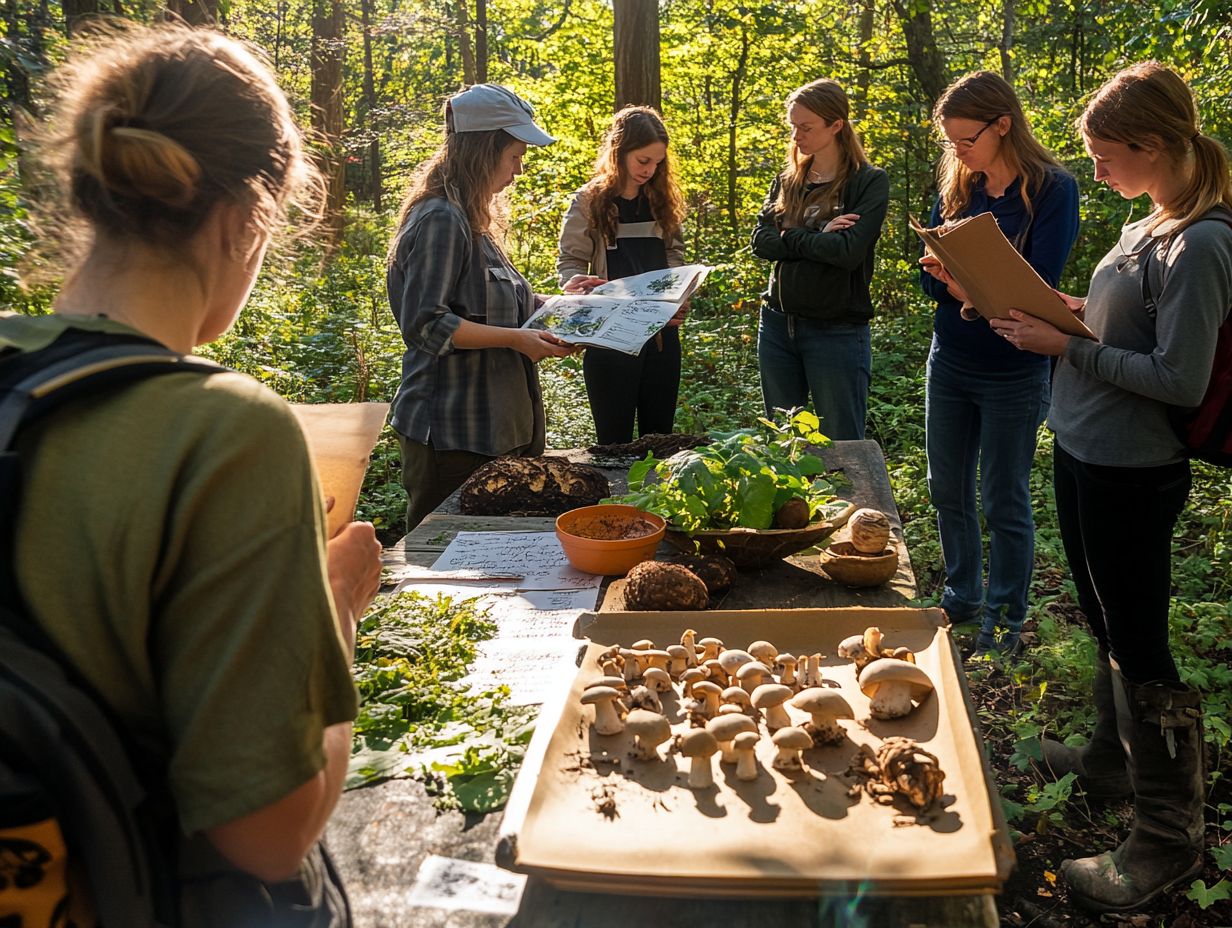
When selecting the ideal foraging certification, such as those offered by accredited colleges or the University of Minnesota, it’s essential for you to consider multiple factors. Begin by evaluating the credibility of the program and ensuring it aligns with Michigan’s food safety regulations. Additionally, you might want to explore how to join a foraging workshop near you for practical experience.
Look for detailed workshop information and helpful resources, including potential gift certificates for family members interested in foraging, that will enhance your experience. Pay attention to the exam requirements and registration processes, as these elements will significantly impact your journey toward certification.
Factors to Consider
When selecting a foraging certification program, it’s vital to evaluate factors such as program quality, training methods, and the exam structure. Additionally, participating in top local foraging events can enhance your skills and ensure that the certification aligns with your needs and adheres to the guidelines set forth by the Michigan Department of Agriculture.
Consider how thorough the training materials are. You ll want them to cover a wide range of edible species and their habitats. Accessibility is equally important; how easily you can access learning resources and the flexibility of exam scheduling can greatly influence your overall experience.
It may be beneficial for you to compare various certification programs based on the extent of fieldwork provided, mentorship opportunities, and community support. Programs that prioritize hands-on learning and offer ongoing resources will better prepare you for the real-world challenges of foraging.
Finding Local Foraging Certifications
Locating local foraging certifications, such as those that meet the Michigan Food Code, is essential for anyone eager to deepen their foraging education. For more information, check out what local foraging classes are available. These programs typically offer valuable insights into Michigan’s regulations and community foraging practices, enriching the skills of certified foragers.
Researching Available Programs
When you’re researching available foraging certification programs, it’s important to explore a variety of methods. Utilize online resources, community forums, and direct inquiries with organizations such as the Michigan Mycological Society to uncover comprehensive program details and join local foraging groups for sustainability.
Engaging with seasoned foragers can offer you invaluable insights. Additionally, dive into reviews and testimonials from certified foragers to illuminate the strengths and weaknesses of different programs. For those looking to expand their knowledge, exploring online courses for foraging enthusiasts can be a great option. Attending local meetups or workshops is also a wise move; it’s here that passionate foragers often share their knowledge, revealing hidden gems within the certification landscape.
Take the time to carefully dissect course contents, prerequisites, and instructor credentials. This is crucial for gaining a thorough understanding of what each program entails and how it aligns with your personal learning goals.
By forging connections within the community, you can uncover recommendations that will simplify the selection process, making it much more manageable.
Asking for Recommendations
Asking for recommendations from seasoned foragers and tapping into community networks is an invaluable strategy for uncovering the best local resources for foraging safety that come highly recommended by certified foragers themselves.
This method not only deepens your understanding of the foraging landscape but also nurtures connections within a vibrant community of certified foragers. By engaging with those who have already navigated the process, you can gain insider insights into which programs prioritize practical training and strong safety practices.
These experienced foragers are more than willing to share their personal journeys regarding specific courses, shedding light on aspects that promote hands-on learning and mentorship. Such firsthand feedback gives you the power to make informed decisions, ensuring that you invest your time and resources in reputable programs that truly prepare you for success in your foraging endeavors.
Preparing for the Certification Process
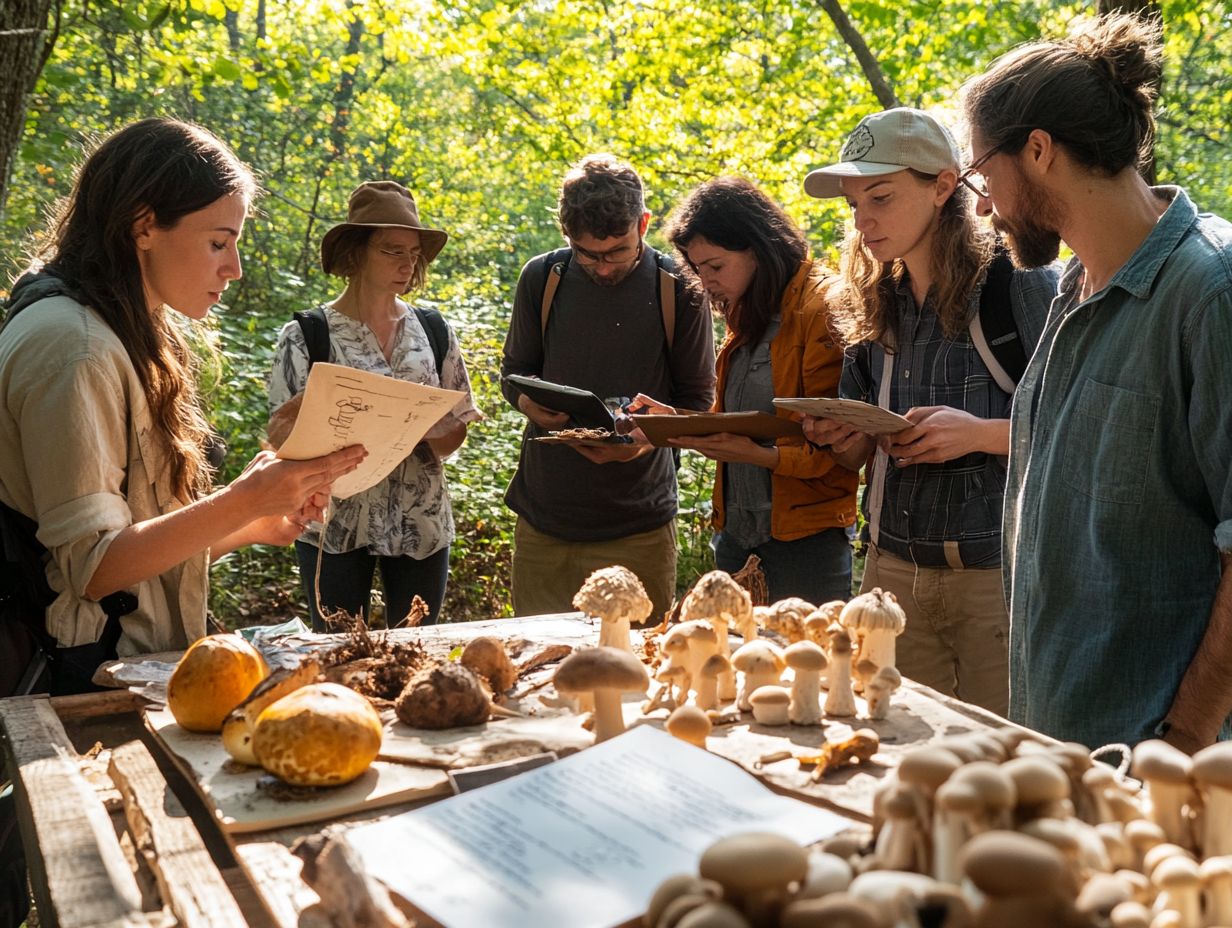
To prepare for the certification process, including the recertification requirements, you need to gain a clear understanding of the workshop details, ensure your exam readiness, and adhere closely to food safety guidelines. This will equip you with the knowledge and skills you need to succeed in your foraging endeavors.
What to Expect and How to Prepare
You can expect a rigorous yet enlightening experience during the certification process, complete with preparation strategies like diving into learning resources, honing your foraging skills, and familiarizing yourself with the exam format, which includes both theoretical and practical components.
Throughout this journey, you ll engage in hands-on workshops that blend theoretical knowledge with practical application. These sessions are specifically designed to deepen your understanding of various plant species and their ecosystems.
As you progress, you will encounter different types of assessments, including practical exams where you’ll identify plants in the field and written tests that gauge your comprehension of the subject matter.
By the end of the program, you should focus on sharpening your observational skills and nurturing a deeper appreciation for the natural world skills that will undoubtedly prove invaluable in your foraging adventures.
Benefits of Becoming Certified
Getting certified as a forager brings amazing benefits! You’ll gain community recognition as a knowledgeable food safety expert, enhancing your reputation among peers.
This certification also grants you increased access to high-quality wild-foraged mushrooms, elevating your foraging experience. You will navigate Michigan’s regulations regarding foraging practices with confidence, ensuring that your pursuits are both lawful and sustainable.
Advantages in the Foraging Community
In the foraging community, you ll find that certified individuals enjoy distinct advantages, such as enhanced networking opportunities, access to a wealth of shared knowledge, and increased credibility among peers and potential clients interested in wild-foraged mushrooms.
These certified foragers often become part of a supportive network, where they can exchange tips and experiences that truly enrich their practices. By engaging with other certified harvesters, you foster an environment of collaboration, allowing for the sharing of invaluable resources like foraging locations, drying techniques, and recipe ideas each of which enhances your skills.
Their established reputation draws in clientele seeking trustworthy sources for wild-foraged mushrooms, unlocking further economic opportunities. Ultimately, these connections not only elevate your individual practices but also contribute to the growth and sustainability of the foraging community as a whole.
Frequently Asked Questions
What is Foraging Certification?
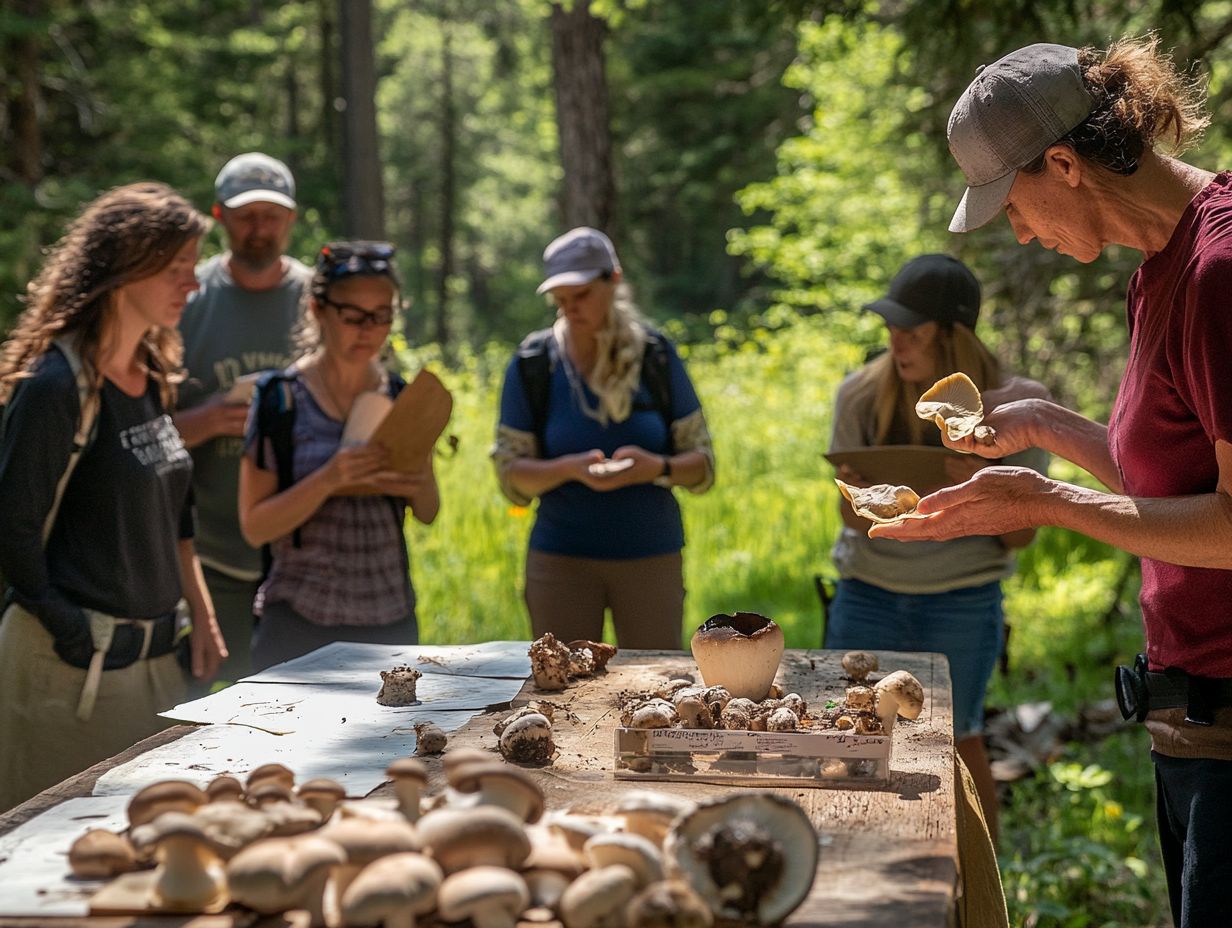
Foraging certification is a training program that teaches individuals how to master foraging in your region to safely and sustainably harvest wild edible plants, mushrooms, and other natural resources.
Why Get a Foraging Certification?
A foraging certification shows you have the skills to identify and harvest wild edibles safely. To enhance your knowledge, consider exploring the best local foraging guides, which can also lead to job opportunities or allow you to sell foraged goods.
Where to Find Local Foraging Certifications?
You can find local programs by searching online. Contact your state’s department of natural resources or agriculture for more information.
How Long Does It Take to Get Certified?
The duration varies, but most programs last from a few days to a few weeks. They may include online coursework and in-person training.
What Topics Are Covered?
Foraging certification programs typically cover plant identification and safety guidelines. You will also learn about sustainable practices and how to research local foraging regulations.
Do I Need Prior Experience?
No prior experience is required for most programs. However, some may prefer basic plant identification or outdoor skills. Always check the specific requirements before enrolling.

